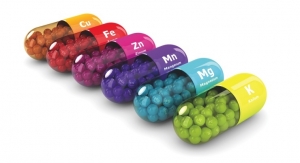06.27.17
Magnesium supplements are among the most popular supplements. ConsumerLab.com, White Plains, NY, recently reviewed the clinical evidence, and purchased and tested popular magnesium supplements sold in the U.S. and Canada.
The tests revealed that four products contained less magnesium than claimed, took too long to break apart in disintegration testing, were contaminated with lead and/or were improperly labeled. Analysis also found that tablets made with a particular form of magnesium was unstable, absorbing so much water from the air as to become wet and could damage nearby supplements. Among the magnesium products that successfully passed testing, ConsumerLab.com’s Top Pick was a product made with a form of magnesium which is stable, well-absorbed, and costs just 6 cents per 200 mg of magnesium, which is about 50% of the daily requirement. Most people get at least the other 50% of the requirement from their diets. The results are now available in ConsumerLab.com's new Magnesium Supplements Review.
The Review details the differences between forms of magnesium, including magnesium aspartate and orotate, magnesium citrate, magnesium chloride, magnesium lactate and lactate dihydrate, magnesium oxide and magnesium-L-threonate, and which of these may be more suitable for various uses, as well as dosage. It also explains why magnesium may be best taken as a single ingredient, despite the fact that it is often combined with other ingredients, such as calcium or vitamin D. It includes tips such as what to look for on labels and how to properly store magnesium supplements. Information about how to get magnesium from foods, and potential side effects and drug interactions with magnesium supplements is also provided.
Magnesium is the 7th most popular dietary supplement among people who regularly use supplements according to a recent survey by ConsumerLab.com. While it is an effective laxative and antacid, and can be helpful for conditions such as migraines and menstrual pain, there is little evidence it helps with restless leg syndrome or leg cramps. Although few people in the U.S. have a magnesium deficiency requiring supplementation, conditions such as diabetes, diseases of the digestive tract, and chronic use of antacid medications may deplete magnesium in the body.
The tests revealed that four products contained less magnesium than claimed, took too long to break apart in disintegration testing, were contaminated with lead and/or were improperly labeled. Analysis also found that tablets made with a particular form of magnesium was unstable, absorbing so much water from the air as to become wet and could damage nearby supplements. Among the magnesium products that successfully passed testing, ConsumerLab.com’s Top Pick was a product made with a form of magnesium which is stable, well-absorbed, and costs just 6 cents per 200 mg of magnesium, which is about 50% of the daily requirement. Most people get at least the other 50% of the requirement from their diets. The results are now available in ConsumerLab.com's new Magnesium Supplements Review.
The Review details the differences between forms of magnesium, including magnesium aspartate and orotate, magnesium citrate, magnesium chloride, magnesium lactate and lactate dihydrate, magnesium oxide and magnesium-L-threonate, and which of these may be more suitable for various uses, as well as dosage. It also explains why magnesium may be best taken as a single ingredient, despite the fact that it is often combined with other ingredients, such as calcium or vitamin D. It includes tips such as what to look for on labels and how to properly store magnesium supplements. Information about how to get magnesium from foods, and potential side effects and drug interactions with magnesium supplements is also provided.
Magnesium is the 7th most popular dietary supplement among people who regularly use supplements according to a recent survey by ConsumerLab.com. While it is an effective laxative and antacid, and can be helpful for conditions such as migraines and menstrual pain, there is little evidence it helps with restless leg syndrome or leg cramps. Although few people in the U.S. have a magnesium deficiency requiring supplementation, conditions such as diabetes, diseases of the digestive tract, and chronic use of antacid medications may deplete magnesium in the body.
















